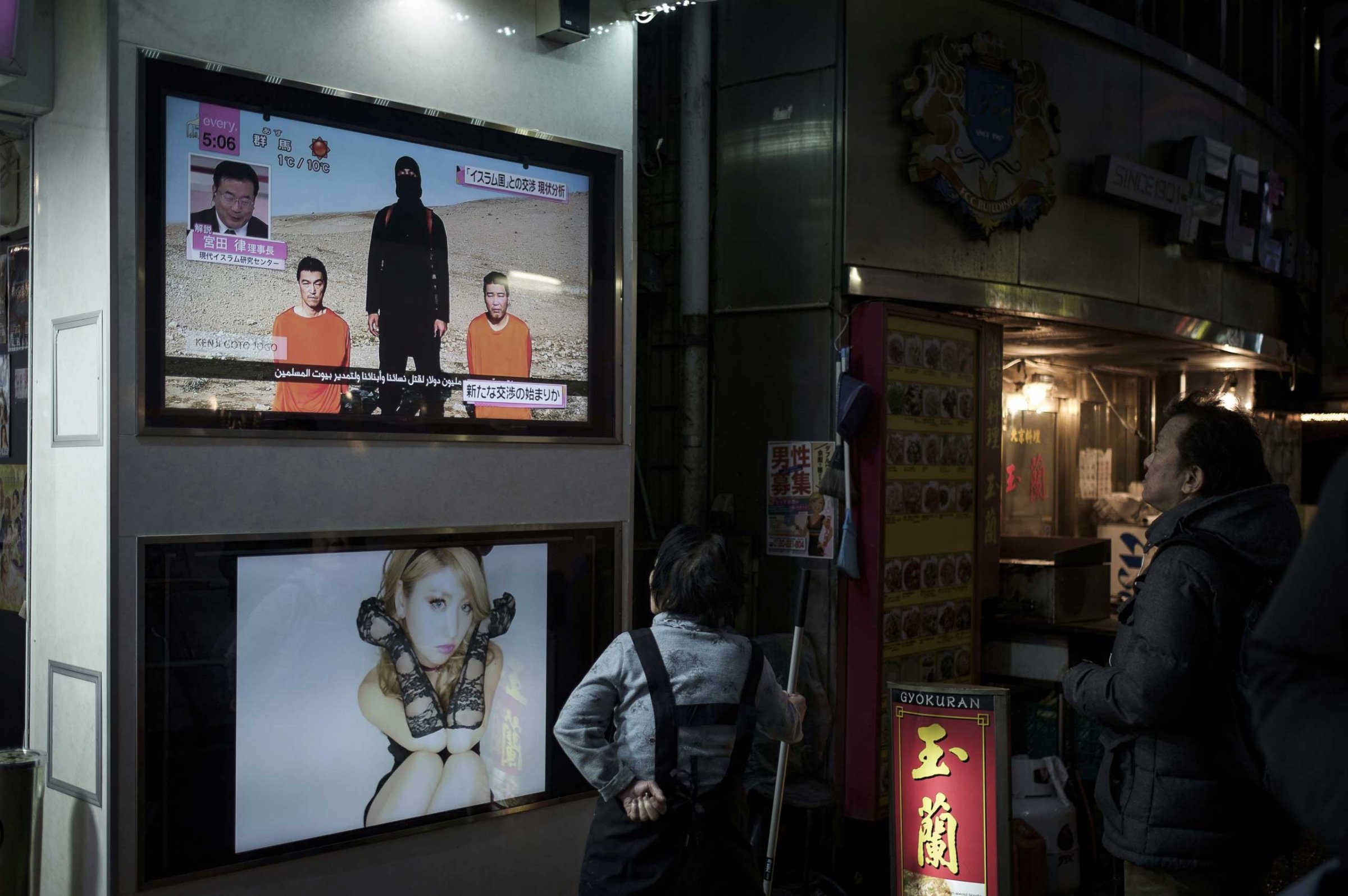
Japanese government officials continued to press for the release of two Japanese citizens being held by Islamist militants in Syria late Friday, even as a presumed deadline for paying the $200 million ransom expired.
The hostage drama has dominated the news cycle since ISIS released a video showing two Japanese men being threatened by a masked militant with a knife. But in very Japanese fashion, much of the anger has focused on the hostages themselves, who are seen by many as having acted recklessly. “The public thinks these guys put themselves in harm’s way, and that it is their problem — not the government’s or the taxpayers problem,” says Jeff Kingston, director of Asian Studies at Temple University’s Tokyo campus.
Haruna Yukawa, 42, a failed businessman who hoped to re-invent himself as a private military contractor, was kidnapped in August after entering ISIS-controlled territory. Kenji Goto, 47, an experienced freelance journalist, was captured in October after entering Syria in what he told friends was a quest to free Yukawa, whom he had met there earlier.
MORE Mother of Japanese Journalist Held Captive by ISIS Pleads for His Release
In the video released Tuesday, the militant accuses Japanese Prime Minister Shinzo Abe of taking sides in the Mideast conflict by pledging $200 million in aid to countries fighting against ISIS, which controls vast territory in both Syria and Iraq. The militant said the hostages would be killed if an equal amount was not paid within 72 hours – a deadline that Japanese officials presume expired Friday afternoon.
Abe has stressed that the aid money—which he pledged during a six-day trip to the Middle East that was interrupted by the hostage crisis—is for humanitarian purposes only and said his government is doing all that it can to secure the hostage’s release. But he has vowed not to “give in” to terrorists, and most analysts believe he will not authorize payment of the ransom—either openly or otherwise.
Comments on Japanese-language social media have been largely unsympathetic toward the two hostages—particularly Yukawa, who told associates that he once tried to commit suicide by cutting off his genitals and later changed his given name to Haruna, typically used for women. Goto is given credit for at least attempting to help someone in need.
MORE Japanese War Reporter Was Abducted by ISIS After Trying to Save His Friend
“They needed to know the possible results before going to that region, especially now. They’re responsible,” said a Twitter post that was re-tweeted more than 1,000 times.
“Neither Mr. Goto nor Mr. Yukawa went to Syria upon request from the Japanese government,” says another. “Maybe I’m heartless, but we cannot give in to the Islamic State group’s terrorist acts.
Japan withdrew all its diplomats from Syria in March 2012 as the civil war escalated, and warned all Japanese citizens against traveling there. The lack of an embassy hasn’t helped Tokyo as it tries to sort through the myriad government, rebel and ISIS forces fighting in the region. The advisory was in effect when Yukawa and Goto entered the country last year.
This is not the first time that Japanese hostages in the Middle East have drawn condemnation from their countrymen, rather than sympathy. Three aid workers and peace activists were pilloried in the press and nascent social media after they were kidnapped in Iraq in 2004. The government refused demands that they withdraw Japanese peacekeepers from southern Iraq and the hostages were released unharmed a week later. Nonetheless, the criticism in Japan was so severe that the former hostages were forced to go into voluntary seclusion.
“The public thought that because those citizens were working independently, and making independent comments critical (of the Iraq War), they were disloyal troublemakers putting Japan into world news for all the wrong reasons,” says Marie Thorsten, professor of international politics and media studies at Doshisha University in Kyoto.
The stakes could be high for Abe, who just won a commanding victory in a snap election held in December. A staunch conservative and nationalist, Abe promised to focus on Japan’s flagging economy, but increasingly has pressed for bigger defense spending, the easing of long-standing restraints on Japan’s military and the promotion of a policy of “proactive contributions to peace” overseas.
“This is the first time the public has seen Abe’s “proactive pacifism” at work and this is deeply unsettling,” says Kingston. “Until now, Islamic extremism was something that happened to other countries. People may get cold feet about Japan assuming a higher profile on global stage.”
Read next: ISIS Say Countdown for Japan’s Hostages Has Begun
More Must-Reads from TIME
- Cybersecurity Experts Are Sounding the Alarm on DOGE
- Meet the 2025 Women of the Year
- The Harsh Truth About Disability Inclusion
- Why Do More Young Adults Have Cancer?
- Colman Domingo Leads With Radical Love
- How to Get Better at Doing Things Alone
- Michelle Zauner Stares Down the Darkness
Contact us at letters@time.com